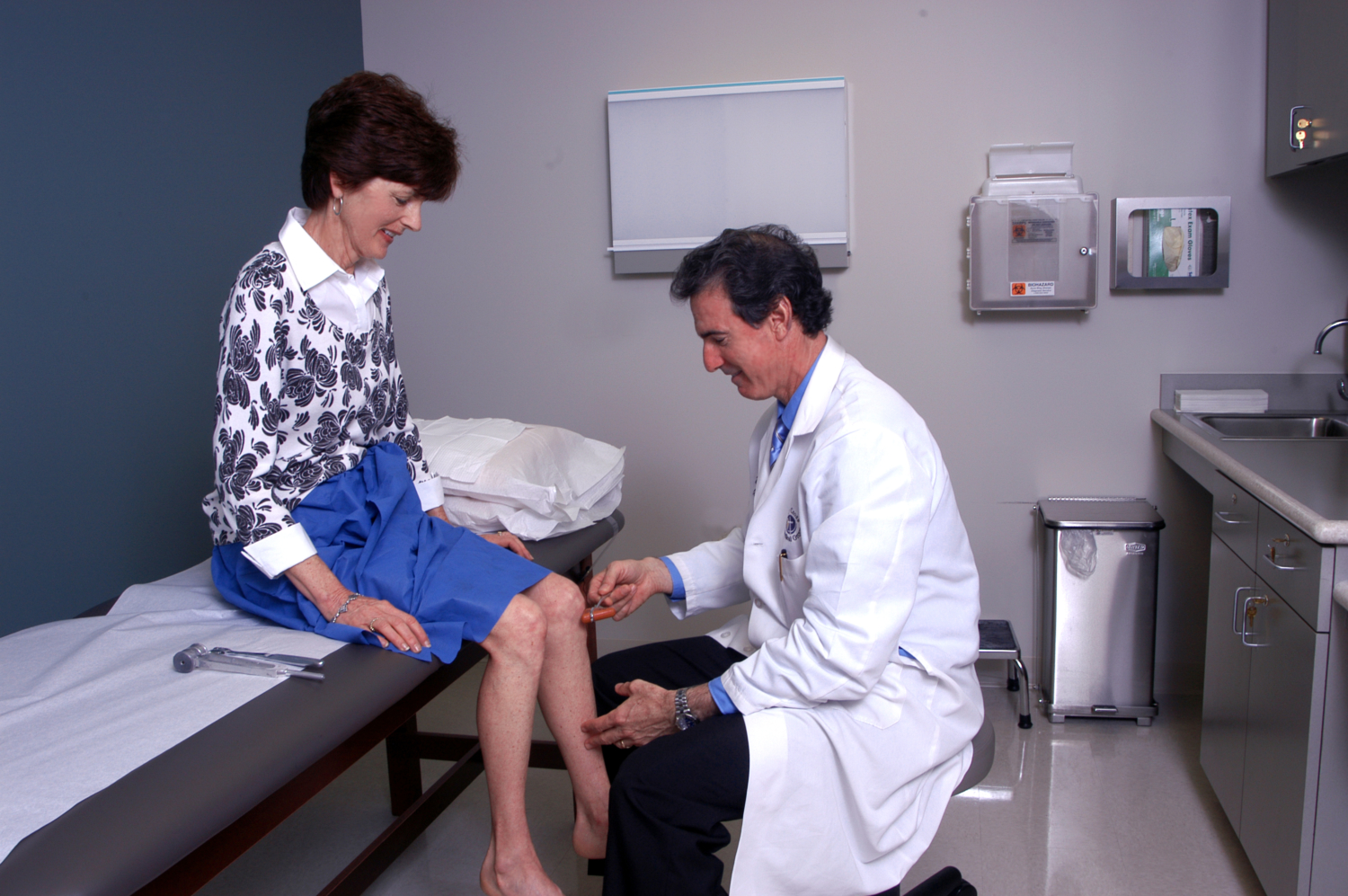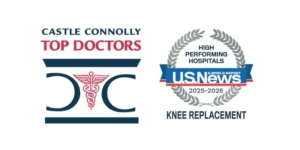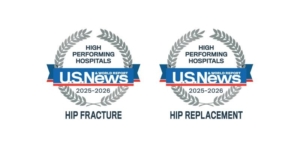Overview
After you have scheduled your surgery, you will receive a pre-operative packet which includes a hard copy of our “Preparing For Your Total Hip Replacement” or “Preparing for Your Knee Replacement” booklet. Copies of the booklets are available for download in Patient Resources. We ask that you bring this packet to the hospital with you for your pre-surgical appointment and on the day of your surgery. This helps ensure that all necessary steps have been completed pre-operatively and that your surgery and hospitalization will go smoothly.
Included in your office packet are details of the steps that must be taken in preparation for your surgery. Our team is ready and available to help you navigate the pre-operative education and medical clearance process, from completing medical forms and managing pre-operative clearance to helping you create an optimal discharge plan or after-surgery plan. We can also help arrange for private rooms, VIP meals and other enhanced services, as requested.
Pre-operative Clearance
Your medical condition must be fully evaluated prior to surgery so that we can better understand and optimize any medical concerns preoperatively and plan your surgery and post-operative care. Medical Clearance is often provided by your own physician. If you do not have a regular physician or prefer to use a physician associated with Holy Cross Health, our staff can help arrange an appointment with a physician who can also be available to see you after your surgery, if appropriate. If your own physician clears you for surgery but does not have privileges at Holy Cross and you need another medical specialist to help manage your care post-operatively, then we can make arrangements for an appropriate specialist to see you.
Please schedule your appointment for surgical clearance 2-3 weeks prior to your scheduled surgery. Our office recommends this time frame in case you require more studies or a consult with another medical specialist. Advance planning helps ensure that your surgery will not be delayed or canceled. Your Medical Clearance for surgery will include a note from the physician who evaluated you “clearing you” to proceed with surgery, blood studies, urinalysis, chest X-ray report, EKG and any other studies which are required.
Note that lab studies must be conducted within 30 days of your scheduled surgery. Results must be faxed to our office at least 7 days prior to you scheduled surgery. Our fax number is 954-489-4584. Because it is so important, we encourage you to be fully involved in this process by calling the physician’s office who cleared you and our office to confirm all necessary information has be received. The Leone Center staff will be here to help coordinate.
Follow your physician’s recommendation regarding flu vaccination. While the hospital supports the Centers for Disease Control’s advice that individuals receive an annual flu shot between October and March in an effort to prevent influenza and pneumococcal infections, Dr. Leone may recommend that you not be vaccinated during your total joint replacement surgery admission process. If so, he may suggest an alternate time for your flu vaccination.
Pre-operative Class
We offer a very popular and informative pre-operative class to help you prepare for surgery. In our experience, when we give our patients information about what to expect, they feel more confident and empowered, which paves the way for a better hospital experience and a better outcome. That is our goal.
At the class, you will meet key members of our team with whom you will be interacting once admitted for surgery. The team will review the entire process, from admission to discharge, using personal stories to make it relatable. They will explain the details of the surgery itself, discuss various methods of implantation, and likely show you an actual prosthesis. We will explain the location of the incision and explain how you can expect it to heal after your surgery. Furthermore, common concerns about anesthesia will be covered extensively.
Therapists and nurses will outline the post-surgical rehabilitation process. Social workers will help you understand exactly what your insurance will cover and all of your care options after discharge. The day of class is also a perfect time to “pre-admit” so that you will not need to worry about additional logistics on the day of your surgery.
Exercise, Nutrition & Self-care
A home exercise program for hips and knees has been developed to help you improve your strength, endurance and range of motion prior to your surgery. These exercises are designed to strengthen and condition your muscles and improve your breathing. Many of these are the same exercises you’ll be encouraged to do after surgery. We have learned that if your body is conditioned to do these exercises before surgery, they are easier to perform after surgery. In addition, by strengthening and conditioning your muscles and improving your breathing pre-operatively, post-operative recovery tends to be faster and easier.
If a particular exercise aggravates your underlying condition or causes pain, do not do it. Pain is your body “talking” to yourself. We encourage gentle persistence and discourage pain.
Optimizing nutrition health before your surgery has been shown to promote faster healing with a lower incidence of complications including infection. We recommend a diet rich in fruits, vegetables, lean proteins, such as chicken or fish, and whole grains to build up your blood levels and nutritional strength prior to surgery.
Do not neglect routine dental work, including oral cleaning. It is recommended that you address any dental issues prior to your hip surgery.
We hope that you do not smoke; however, if you do, it is important to stop smoking 3 weeks prior to your surgery. This will make the operation much safer for you and improve your healing.
Start Taking Several Weeks Prior to Surgery
- Vitamin C, 1000mg, twice a day, will improve iron absorption and the ability of your tissues to heal.
- Iron, Slow Fe is recommended, twice a day with meals. Note that iron may cause constipation or diarrhea and your bowel movements may appear black. If this occurs, you may need to decrease or stop the iron. Do not eat dairy products one hour prior to or after taking iron because dairy hinders iron absorption.
One Week Before Surgery
You will return to our office approximately one week prior to your surgery. We will review your pre operative clearance, post-operative discharge plan, and any special concerns or needs you might have. You will be given specific instructions regarding which medicines to take and which to stop taking prior to your surgery. The following are general medication guidelines that will be tailored to your specific needs.
Stop Taking Prior to Surgery
- Blood-thinning medications or herbs to reduce the risk of bleeding during surgery. If you regularly take a blood thinner, you will be given specific instructions by your physician and by our team about when to stop taking this medication. Your physician may substitute your current medication with a different, shorter-acting blood thinner until your surgery.
- Vitamin E, fish oil, NSAIDs, or other aspirin-like anti-inflammatory medicines for at least 14 days prior to surgery. You may continue to take Tylenol if needed.
- DO NOT EAT OR DRINK LIQUIDS AFTER MIDNIGHT THE DAY PRIOR TO YOUR SURGERY. My team may instruct you to have a glass of Gatorade or clear juice when you first awaken the morning of your surgery if your surgery is scheduled later in the day.
Traveling For Surgery
Many patients travel from other parts of the United States or other countries for their surgery. Our staff and our international department will work with you to customize the preoperative process to meet your needs.




